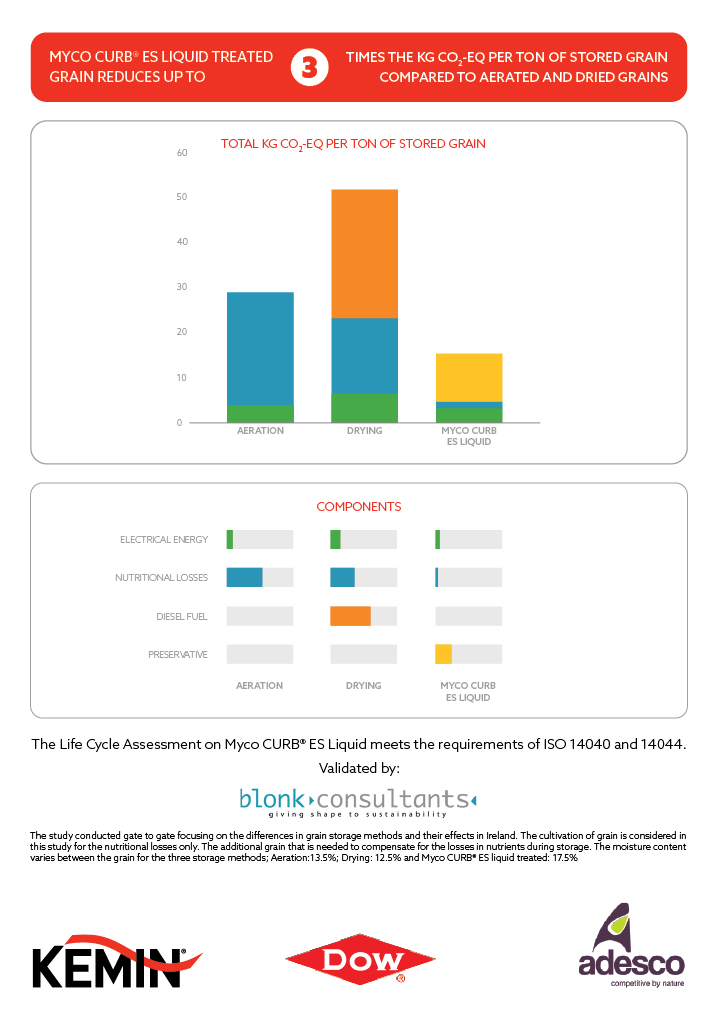The practical storage of grains or feed is critical for livestock farming. However, grain preservation depends upon various factors like dry matter content, storage time, temperature and facilities available for processing and storage on the farm. For long-term preservation of grains, different mould inhibitor surfactant solutions can be used to protect them from microorganism degradation. Our solution, Myco CURB® ES liquid, for grain preservation, is effectively used to inhibit the growth of molds. Myco CURB ES liquid contains a synergistic combination of organic acids, their salts and surfactants and is therefore an advantageous method for prolonged storage of grains.
Climate change is a global issue, and the increase in greenhouse gas emissions has raised serious concerns for our planet. It is important to take critical measures according to the United Nations’ 17 Global Sustainable Development Goals for reducing greenhouse gas emissions and improving sustainability.
In addition to climate change, the global demand for grain production is increasing and we need to keep our agricultural footprint as low as possible to be sustainable. That’s why we’ve conducted a gate-to-gate Life Cycle Assessment Study to check the carbon footprint of grains stored using our Myco CURB ES solution. As part of the study, greenhouse gas CO2-eq emission has been determined by comparing three different methods of grain storage (wheat and barley) — aeration, drying, and preservation addition.
Stored grain treated with our Myco CURB ES liquid solution produces up to 3 times less CO2-eq per ton of grain, in comparison to other grain storage methods- aerated and dried. It’s important to note that the amount of carbon produced when using Myco CUB ES liquid in this study, is in accordance with the environmental standards of ISO 14040 and 140444.
The aerated and drying grain storage methods results in increased CO2 emissions in comparison to the Myco CURB ES liquid treated grains. Myco CURB ES liquid is a buffered solution containing organic acids, salts, and surfactants which act synergistically, to preserve grains, and essentially contributing to the reduced CO2 production.
Our Life Cycle Assessment Study, together with Dow, demonstrated that drying and aerating grain means a larger carbon footprint in comparison to treating grains with Myco CURB ES Liquid.
The addition of a mould inhibitor – a preservative based on propionic acid and a synergistic combination of other organic acids, their salts and surfactants – enables a reduction of approximately two to three times the carbon footprint in kilogram CO2-eq per ton of grain stored, compared to aeration and drying methods, respectively.
As our customer, you can now use these insights to optimise the sustainability impact of your grain production.
For us at Kemin, the results of this study are a decisive step in defining the Life Cycle Impact Assessment of our entire value chain. With this knowledge, we are encouraged to continue using data and science in all our activities across the value chain to further improve our solutions, add value and contribute sustainably.

In a nutshell, Myco CURB ES liquid has many positive environmental effects. It produces three times less agricultural carbon footprint and is safe for the environment in comparison to other grain storage methods. Additionally, using this solution means improvement in the quality of livestock feed and this significantly impacts the performance and growth of livestock. The use of Myco CURB ES liquid results in reduced mold growth and nutritional losses, minimises the risk of mycotoxins, and prevents insects (mites) in the grain — all resulting in the superior quality of stored grains, which in turn enhances the development and performance of ruminants and other livestock. All-in-all, at Kemin we believe it is crucial to adopt optimal grain storage practices which enhance animal production and environmental sustainability. Our solution, Myco CURB ES liquid, contributes to sustainable farming practices.
Interested to have more information on this study? Download now for free the technical literature.
© Kemin Industries, Inc. and its group of companies 2026 all rights reserved. ® ™ Trademarks of Kemin Industries, Inc., USA
Certain statements may not be applicable in all geographical regions. Product labeling and associated claims may differ based upon government requirements.